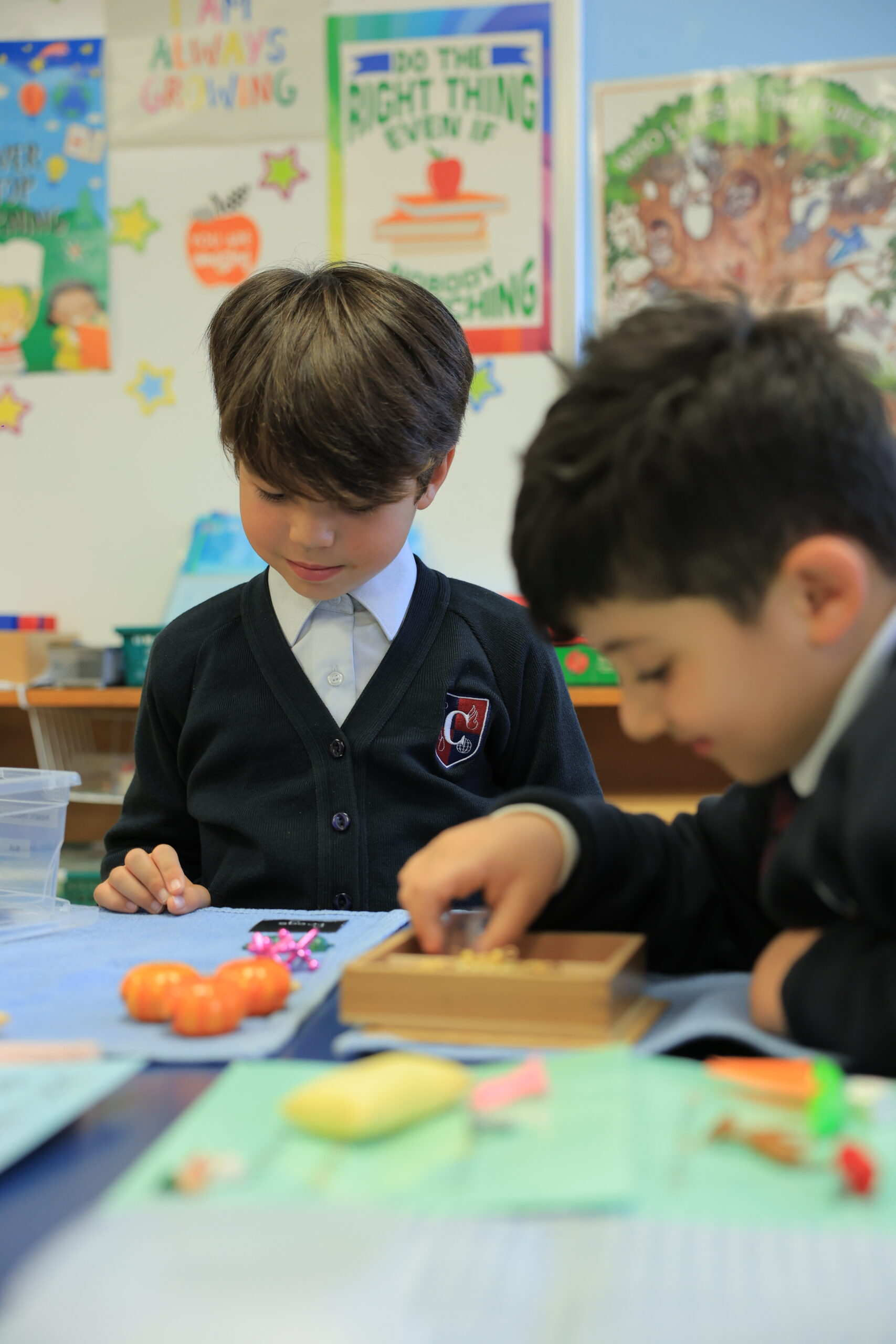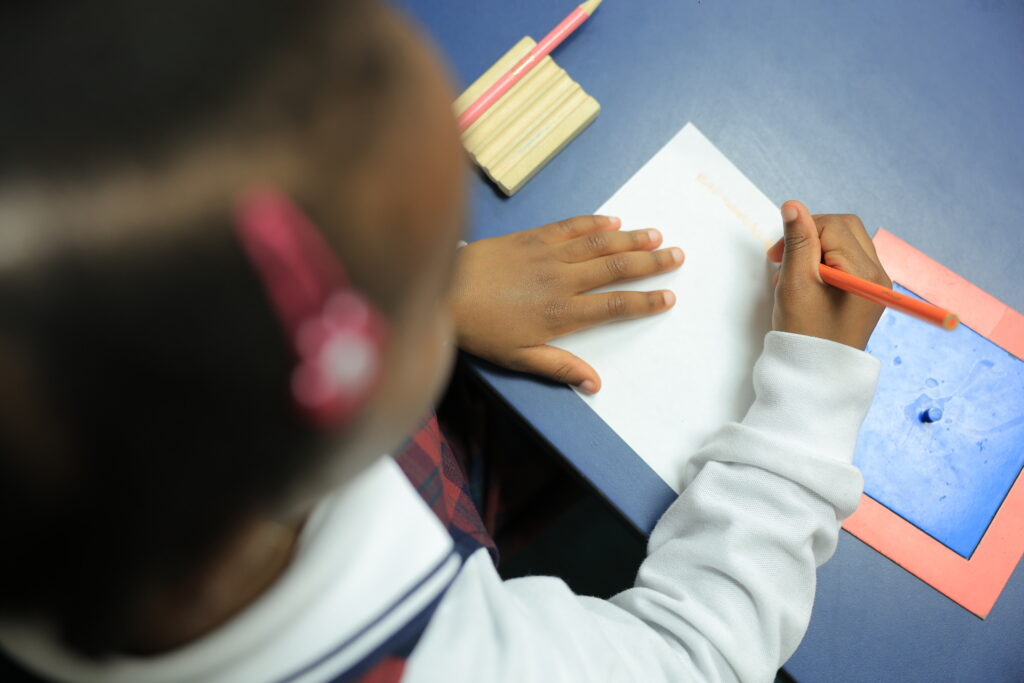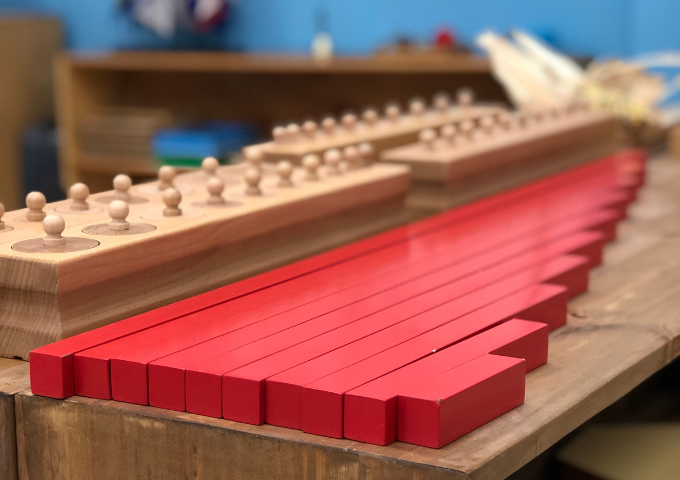Montessori Kindergarten
Children under six have an impressive ability and drive to absorb knowledge from their surroundings. We at Century Private School strongly believe in taking advantage of this sensitive period through our series of JK/SK programs that promote multi-sensory learning.
JK/SK Montessori School Programs
By offering various forms of stimulation while permitting children the freedom to pursue their own educational inclinations, the optimal path of personal and social growth can be found and pursued. While we approach education from a holistic perspective, our curriculum does have several distinct components.
Hands-On Mathematics
Our mathematics offers children physical, hands-on materials such as Sandpaper Numbers, the Bead Stair, the Binomial Cube, etc., to help them develop an understanding of number symbols, quantities, basic algebra, and geometry. Games and activities are used to promote problem-solving skills that will combine with this numerical knowledge to form a strong base to carry the child into the more advanced elementary material.
French Education
An extension to our language program is French education. Children are exposed to French songs, stories, and activities that help them develop a sense of the language’s vocabulary and structure. Following themes like “The Calendar” and “Parts of the Body,” students learn how to express themselves in our country’s second official language.

Comprehensive Language
Language is not just about what people say. It encompasses social interactions, reading, writing, how we listen and are listened to, and more. The ability to clearly phrase and express thoughts, as well as understand others, is an integral element of social growth. Century Private School’s language program promotes these abilities while also developing key literacy and phonic skills through various concrete apparatus such as Sandpaper Letters, the Small and Large Movable Alphabets, the Phonetic Farm, etc. We are proud to say that our students enjoy faster progress in language skills.

The Arts
From paint to clay, Century Private School provides numerous visual mediums children can use to show their creativity. By talking about their creations and those of their peers, students develop a sense of different designs that will encourage perception skills and form the basis of art analysis in later years.
For the more vocally inclined, there is also our music program. Singing songs and playing with instruments instills auditory, precision, and choral speech skills while being extremely fun as well. Our music program partially draws on the work of Carl Orff, who considered music as another form of language. It draws on children’s innate sense of imagination and fantasy to teach simple, natural elements.
Sensorial
It is through the senses that the child studies and improves their understanding of their environment. Through work with materials such as cylinder blocks, thermic tablets, and red rods, students learn to classify the things around them. This classification empowers a child with the first steps in develop their intelligence, which then allows them to better adapt to their environment.It is through the senses that the child studies and improves their understanding of their environment. Through work with materials such as cylinder blocks, thermic tablets, and red rods, students learn to classify the things around them. This classification empowers a child with the first steps in develop their intelligence, which then allows them to better adapt to their environment.

Culture
Montessori cultural materials are designed to help children gain knowledge about Science, Geography, History, and Biology. The Culture curriculum provides a wide array of activities including learning about the continents of the world, animals and habitats, the story of man, and botany and zoology. Lessons in culture enable children to enrich their understanding of the world and their place in it.
Montessori Kindergarten & Senior Kindergarten FAQ
Montessori Kindergarten (ages 4-5) and Senior Kindergarten are designed to build on foundational skills developed in the Montessori preschool years. These programs emphasize hands-on learning, self-directed activities, and collaborative play, further developing a child's academic, social, and practical skills.
Unlike traditional Kindergarten, Montessori focuses on individualized learning, where children progress at their own pace. The classroom environment is designed to encourage exploration and independence, with children engaging in self-chosen, hands-on activities instead of structured, teacher-led lessons.
Montessori Kindergarten offers several unique benefits:
- Individualized Learning: Children work on projects tailored to their interests and skill levels.
- Solid Academic Foundation: Advanced concepts in math, reading, and science are introduced with interactive materials.
- Practical Life Skills: Activities like cooking, cleaning, and organizing build responsibility and self-sufficiency.
- Enhanced Social Development: Older children mentor younger ones, building leadership and empathy.
- Focus on Critical Thinking: Montessori activities encourage problem-solving and independent thought.
Montessori Kindergarten builds strong academic and social skills that ease the transition to elementary school. Students learn to work independently, complete tasks, and collaborate with peers—skills that are valuable for any future educational setting. Montessori graduates often adapt quickly to traditional classrooms due to their confidence and self-discipline.
Montessori Kindergarten covers language arts (including reading, writing, and storytelling), mathematics (addition, subtraction, and geometry), science, and cultural studies. These subjects are introduced with tactile materials that allow children to understand concepts in a hands-on way.
In Montessori Kindergarten, children develop social and emotional skills through group activities, peer interactions, and collaborative projects. They learn conflict resolution, empathy, and effective communication in a mixed-age environment, which encourages mentorship and social awareness.
Montessori Kindergarten emphasizes practical life skills, such as organizing, caring for the classroom environment, and managing daily tasks. Children are encouraged to take ownership of their work, clean up after activities, and make choices, fostering a sense of independence and responsibility.
In Montessori Kindergarten, teachers act as guides who observe each child’s interests and developmental needs. They provide materials and guidance to support self-paced learning rather than delivering lectures or directing all activities. This approach helps children build confidence and self-motivation.
Senior Kindergarten in Montessori allows older students to refine their skills in preparation for elementary school. Children strengthen their academic foundation, improve their concentration, and master practical and social skills. The final year is often when children experience a significant leap in their ability to work independently and take on leadership roles.
While Montessori can benefit a wide range of children, it may be especially suitable for those who enjoy hands-on learning and an environment that values self-direction. Observing your child’s learning style can help determine if Montessori is the best fit.
Yes, children can transition smoothly to traditional elementary school after Montessori Kindergarten. Montessori’s focus on self-discipline, independence, and academic skills equips children with the tools needed to succeed in a structured classroom setting.
Visiting the school, observing a Montessori Kindergarten class, and meeting with teachers can provide insight into the Montessori environment and whether it aligns with your child’s learning needs. Look for a program that adheres to Montessori principles and is attuned to fostering your child's natural growth.
Admissions
- Submit Your Application
Start your journey with us by completing our online application form. It’s quick and easy, and it’s the first step toward joining our school community.
- Personalized Follow-Up
After we receive your application, our admissions team will reach out to discuss next steps and answer any questions. This is your chance to learn more about what makes our school special.
- Prepare for Your Start
Once accepted, we’ll help you get everything in place for a smooth beginning at our school, from orientation details to necessary materials.
